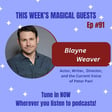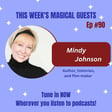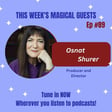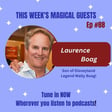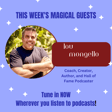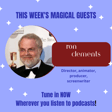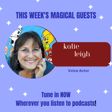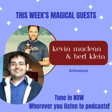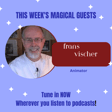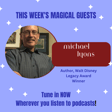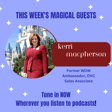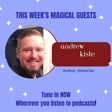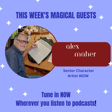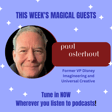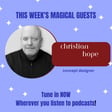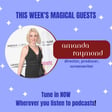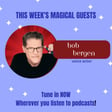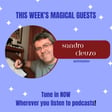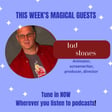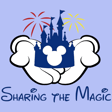Become a Creator today!Start creating today - Share your story with the world!
Start for free
00:00:00
00:00:01

Episode 69: Greg Ehrbar
On this week's show we're joined by Greg Ehrbar, a writer, editor, and producer who's career spans over 40 years, 30 of which were with the Walt Disney Company. Greg shared so many wonderful stories from his career, you really don't want to miss this one!
For more from Greg, check out his website HERE
DISCLAIMER: We are not an affiliate of the Walt Disney Company nor do we speak for the brand or the company. Any and all Disney-owned audio, characters, and likenesses are their property and theirs alone.
Recommended
Transcript
Introduction & Podcast Overview
00:00:01
Speaker
Welcome to Sharing the Magic, the podcast that takes you on a journey through the enchanting worlds of Disney. Each week, we're joined by a special guest, whether they're a magician creating moments of astonishment or a Disney expert sharing the secrets behind the magic of the happiest place on Earth. Together we'll uncover the stories, inspirations, and behind the scenes tales that bring these worlds to life.
Meet the Hosts and Special Guest
00:00:32
Speaker
So, get ready to be spellbound and transported to a place where dreams come true.
00:00:53
Speaker
Good evening, everyone. And welcome to another great episode of Sharing the Magic podcast. I'm your host tonight, James Kemp. And we have a great guest tonight, guys. This is one of my favorites. It's been on the list. Great. Got 30 years within the Disney Corporation. It has a laundry list of other accolades that we will hopefully touch on. And, you know, let's listen to our cast tonight. Tonight we got Dawn. How you doing, Dawn?
00:01:19
Speaker
Hi, I'm doing really good. i'm Nice to meet you and excited to hear about all of your ventures you've had. I can't believe you've been with them 30 years. You must have started when you're 10 because you This is the audio cast, but you look so young. Next up, we have Ashley. Ashley, how are you doing tonight? I'm great. Nice nice to meet you guys and to officially jump on and experience this. I'm excited and to meet somebody who's been with disease as long as you have. That's amazing. I can't wait to hear about your experience. like day for Second, but not last, our good friend, Lisa. How are you doing tonight, Lisa?
00:01:55
Speaker
Hi, everyone. I am doing really well. Just about a week away from a Disney World vacation, so I'm looking forward to that greatly. So good to be here. Can't wait to hear from our guest.
00:02:09
Speaker
And lastly, sorry, I had, I muted myself on accident. Lastly, uh, Jeff, I, I'm not forgetting you. Okay. Jeff, our goofy, our goofy dupe who is in the dark. tonight He's got a migraine tonight. So he's, he's got, he looks for forward to, uh, to listening and, and kind of being in a spectator, but you know, but I'm, I'm happy to be here none nonetheless, but.
00:02:33
Speaker
Yeah, we're definitely happy that you're with us again tonight, Jeff. We missed you last week, but we are back this week and we're gonna have a good show. Now let's introduce our guest tonight.
Greg's Disney Journey Begins
00:02:43
Speaker
Again, we've we've alluded to the man himself, Greg. How are you doing, Greg? Arabar, right? Am I getting that?
00:02:49
Speaker
Perfect. Thank you very much. I usually butcher names pretty, pretty tough. it Prior military, we butcher a lot of lot of names. It's tough, but yours, I didn't want to butcher it, so I didn't. ah So I'm going to let Lisa start off with the questioning with of you tonight. Lisa, jump on in. Hi, Greg. We like to ask our guests the first question. How did you develop your love of Disney and what's your connection with Disney?
00:03:17
Speaker
Well, my connection with Disney started with the records that I listened to as a kid because I loved my Disney records and I didn't have a ton of them, you know, that the collection grew and the Sunday night show the the wonderful world of color and then the wonderful world of Disney. Those are the ones I knew. but um And it it only intensified because then as we got into the 70s, they reran the Mickey Mouse Club, which I barely remembered when they reran it in 62.
00:03:51
Speaker
And then when I first visited Walt Disney World in 72, my life was changed forever. I just said, I have to be part of this. i I mean, this is Disney that you can walk through and it's big and it's got monorails and hotels and it's like Dorothy. I feel like I'm not in Florida anymore because it didn't see I grew up in South Florida. And while it had palm trees and that kind of thing, there was nothing like it. And and that was at the era where there were just so many great films to enjoy. And I just totally became immersed in it. And I didn't even know it was I've always felt like if I didn't work for Disney, I'd always be grateful anyway.
The Story of 'Mouse Tracks' and Disney Records
00:04:35
Speaker
because it was the thing that, the the it was the thread that all through high school, all through college, I wanted to be part of it. So it helped me choose classes, it helped me have, it's always good to have a goal, whether it necessarily happens or not.
00:04:50
Speaker
So it sounds like Disney may have helped you plan out or maybe make the blueprint for your life if that was in some in some way that you knew that your end result wanted to, if you wanted to end at Disney um at some point. um But I do understand that you had a part with um the story of Walt Disney Records mouse tracks. That Can you tell us a little bit about that?
00:05:16
Speaker
I wrote that with Tim Hollis, a very good friend and an excellent writer who's written a lot of great books. And we were actually published that in 2006.
00:05:30
Speaker
And um they're in their in discussions, to even though the book is going to be 20 years old soon, It is not really at a date because it's about an era, the vinyl era, of Disney Records and the people who who built what it is today. And so that the there is discussion going on. do I finally do an audiobook version of that. um You're the first to hear that. on this show. That's awesome. That is amazing. That's the main way that I read, so that made me very happy. In that in that book, i and the reason I asked this, because you did the history of it, how tied were you to Bambi Moe when it came to producing that book? Because I know she was very heavy in the the disney Disneyland records, Walt Disney Records. ah how How tied were you to her when it came to producing this book?
00:06:25
Speaker
That's how i got to know bambi because i interviewed her ah for the book i knew i knew of her because i was one of those people who when you listen to an album you stare at the cover for hours as it plays. So and i was all i'm also one of those people that reads the credits.
00:06:41
Speaker
and stays when everybody else is leaving and reads all the credits. Maybe Lord of the Rings, that might be an exception because those credits are still running. But as far as Disney movies, I would go in. my One of my favorite Disney books is the Disney films by Leonard Malton.
00:07:00
Speaker
um Leonard Maltin was an idol of mine. Now he's he's a colleague, but i I adapted the style of writing really from the way he wrote the Disney films because the format is so perfect and it gives you a context of the the the sequence of how these films were done. But I would copy down all the credits out of his book and then go to Like See Lady and the Tramp and read along with the screen because I wanted to know who these people were.
00:07:28
Speaker
And there wasn't a lot of reference material at first. You know, that there were not tons of Disney books. So this was one of the early ones. And what we found was, Tim and I, is that the area that has not been covered that we loved what were the records and the great people that either were already known, like Fess Parker and Annette and Sterling Holloway and people like that and the Sherman brothers who and their their contributions to it.
00:07:55
Speaker
but also a lot of people with the record company who, if you listen to the records and the read-alongs and all, you knew their names, but didn't know about them, like Robie Lester and Terry York and Ginny Tyler, and especially Tutti Camarada, who was sort of the waltz of the record company, and Jimmy Johnson, who was the president, was the Roy.
00:08:16
Speaker
because Tootie was an artist and repertoire director, so he chose the music and brought in the
Influential Figures in Disney Music History
00:08:23
Speaker
artists. And because of his work with Disney, he opened the Sunset Sound Studio on Cherokee and Sunset, which is still there.
00:08:32
Speaker
And the list of great artists that perform there is pretty much any any great group or singer you've heard of recorded at Sunset. And not just Disney, he opened it because they didn't have a proper recording record, recording studio on the lot. And Roy said, why don't you become a vendor? Become a, we'll be your client.
00:08:52
Speaker
And that's why he did it. And to this day, that studio is still there. The the guy was a genius and a brilliant arranger. And just ah he formatted the soundtrack albums. You know, the the soundtrack albums used to be done like on MGM soundtracks. They were modular so they could be made into 45s and 78s, things like that. They didn't have the same kind of format that a Broadway show album had.
00:09:17
Speaker
2D came up with the idea of you open with the overture, then you have an instrumental, then you have a vocal, and sometimes he mixed up the order so that the recording was a home recording you heard at home and it played that way. It wasn't always chronological. That format really was his.
00:09:33
Speaker
so that's That's kind of why. When you write a book like that and the book that I currently did about Hanna-Barbera, you write it because you feel like this story really needs to be told. And I just love this material so much that, you know, I'm happy other people do too.
00:09:50
Speaker
Yeah, the reason I asked, I actually got to hear Bambi speak um at a convention up here in the Pacific Northwest. And so her name came to mind as soon as I saw that book and her story into like kind of what you're describing, like she fell in love with the records and she fell in love with everything else. And so the idea of having the vinyls, you know, and the story about the vinyls really resonated with me and I just wanted to know, you know, how tied do you know that stuff was. And now that you told that story about Sunset, it all makes sense now as to why.
00:10:18
Speaker
Yeah, she she's a very good friend. She's she's just a wonderful person. And um we've we've known each other for many years now. And we have a mutual friend and Jim Megan, who was the producer of most of those albums and read alongs. And he mentored her.
00:10:34
Speaker
for the job he was doing and he'd gone on he went on to TV animation and was a story editor for Gummy Bears and DuckTales and you know great shows like that. And then Bambi went over to television animation and was the VP of the music that you heard on all those shows.
Greg's Production and Album Work
00:10:52
Speaker
So very, very major careers, both of them. And she talked to me about, she had a great time at that event. She really, really had fun at that and everybody was so kind to her.
00:11:05
Speaker
ah she was was wonderful and she was kind to everybody else and you know that people like that who have great careers you know we we like to hear about them we like to hear about your story as well um i have a question so i know we're audio podcasts like i said but what is behind you because i'm seeing billboard i can can't make out all the words but i was trying to find something more disney to head up because i had the hannah barbera building and i put the uh i was just looking through my files not that i wasn't paying complete attention and but But no, that's actually an album I produced. I produced some record while CD albums for Rhino Records, and this is called billboard family classic filming Billboard Family Christmas Classics. That was a series of the Billboard Family Classic series. We did lullabies, we did songs about travel.
00:11:52
Speaker
We did scary songs, things like that for Rhino. And I worked on those and then I did a a series of albums called Toon Toons, which were collections of theme songs from different cartoons.
00:12:05
Speaker
I did a lot of things for Rhino, a lot of ah reissues of Golden Records from the 50s and 60s and quite a few things for Walt Disney Records. so i just But I just found that. i didn't I didn't put it up there for any other reason. I was just looking for something. and um Regarding the book itself, Mouse Tracks, did you ever interview ah either of the Sherman Brothers or have you met them?
00:12:29
Speaker
yeah I met Richard many times. I interviewed him for I was writing when I was with Disney and marketing. um I was writing a lot of interviews for online and for ah magazines. We would do promotional magazines and things and I would edit the magazines and do stories. So I interviewed him a bunch of times and then when I moved out here to To California, I was at various events where he was, and I got to know some of the other Sherman family members as well. Never had the pleasure of meeting Robert. I know his son, Robbie, and one of the one of the nicest things I ever heard was, Robbie told me that his father, Robert, read mouse tracks twice because he enjoyed it so much. I mean, I can die happy, what can I say?
00:13:18
Speaker
So exciting. I can't wait to get it. I almost want to actually, instead of get the audio book, because I'm like Lisa, I i love because on on the airplane it's so easy, right? But the cover is just so, I don't know, it just makes me think of the era, you know, you have to go on and pull it up so you guys can see it online. But it has like a, is it a 50s vibe maybe?
00:13:41
Speaker
it It actually is. It's early 60s. That was Tim's idea. That was an actual ad that Disneyland Records so was it was they used to do actually Jimmy Johnson. There's another book that I edited with Didier Ghez.
00:13:57
Speaker
ah which is called Inside the Whimsy Works, My Years with Walt Disney Productions. And it's his story about he how he started out in in the, it was like ah um an errand, he did errands and then moved into insurance and then moved into merchandise and publications and then founded the record company. And um if you've seen Mickey Mouse magazine, that was him. If you've seen the book, The Art of Animation, that was him.
00:14:23
Speaker
He also started direct marketing at Disney. and so Direct marketing they would they is these things where they mail you a big packet and they try to sell you a series of books or a series of... Well, they used to do that with records. and It would be like 10 albums for 1999. He describes in his book what goes into a direct marketing piece. and That was the the art of the happy family playing the storyteller albums.
00:14:51
Speaker
It's very much a golden book. Remember golden book? That total for me growing up, this would have been one of my like golden book kind of looking covers with the mom and then the quintessential pipe and the dad's mouth. let's get with five I just love it. It cracks me up. Okay, so when I was reading the description, um it said even Walt Disney,
The Birth and Rise of Disney Records
00:15:14
Speaker
so did he sing?
00:15:15
Speaker
walt disney made one record and his record company made a vast amount of records but he only recorded one And it was the first one that they actually produce themselves and and manufactured and marketed. It was called Walt Disney takes you to Disneyland.
00:15:31
Speaker
And it was a series of um sound effects and musical suites, more or less, and overtures that brought you in an audio way into each land. And he narrated the the opening. He pretty much read a paraphrased version of the plaque at Disneyland. And then he described what was going on in each land. And then the sound and the music would take over from there.
00:15:55
Speaker
And that was it. I just want to listen to that on replay every night before I go to sleep. that's all im very And it's very accessible. It's it's available, I believe, on ah on some streaming services. And they reissued it on vinyl. And they also reissued a CD with a replica of the actual cover art on it.
00:16:14
Speaker
Okay, I'm gonna say one more thing and I'll let somebody else have a turn. But um I can remember taking my kids to Disney World um just at a very, they were very young and we would go into Frontierland and you could hear Davy Crockett, King of the Wild Frontier. My kids would beg me for the raccoon skin cap at the gift shops, things like this. So I noticed that was one of the big hits that kind of got the ball rolling. Can you kind of talk a little bit about that? And then I will hush for a minute.
00:16:44
Speaker
It's a good question because for a long time people don't realize um they just assumed Disney always made records. They didn't make them until 1956. They didn't have sheet music that Disney owned. As a matter of fact, to this day, the Walt Disney Company does not own the songs in Snow White, Pinocchio, and Dumbo, and many of the the silly symphonies like Who's Afraid of the Big Bad Wolf.
00:17:08
Speaker
because they weren't in the sheet music business. So the Irving Berlin Company ah bought the rights because that's what they did. And so they originally they didn't own the rights to the Bambi music and some other ah ones, but they bought back. But the what happened with Irving Berlin is his partner,
00:17:29
Speaker
saw Bourne, they split. Irving Berlin kept all of his compositions and Bourne got everything else. And the Bourne company still owns all those songs and Disney has to pay them to use those songs. Only with those scores. It was the same thing with records.
00:17:46
Speaker
When Snow White came out, it it there was a soundtrack 78 set. It was the first original soundtrack album from a film in history. It's in the National Music Registry. It's a very historic moment. There were no other, they didn't do that in those days, but it was on RCA. And the album of, um oh, let's see. but RCA, Columbia, DECA, all of the big companies either did the official sort of album or they did um cover versions with other artists singing the songs. And in the late 40s, early 50s, that was the boom of children's records.
00:18:26
Speaker
because a lot of, you know, TV was just beginning, there was no video. So kids played records a lot in those days and they would chart. The the story album of of Cinderella with Eileen Woods and the original cast reenacting the story from 1950 was actually in the top 10, the pop charts.
00:18:47
Speaker
because they sold so many. Bozo the Clown was very popular in records, Bugs Bunny and all of those. So there are capital Disney records and all, but they didn't make their own. Now, Jimmie Johnson saw that all that money was going to the record companies and they were only getting license fees and maybe production fees. And um even though they may have even owned the actual recordings. So he was trying to get Walt and Roy to agree to that and it took him years.
00:19:14
Speaker
And I think it was with trying to think in the history here, Davey Crockett was a number one hit for weeks and weeks in 1954. And because Disney didn't have a record company, ah what they used to do in those days is sheet music would go out, the music would go out, and the success of a song before there were the Beatles and rock bands, is the the success of a song was based on how many artists could do cover versions.
00:19:42
Speaker
Like if you ever see the movie State Fair with Jean Crane, the guy who's the music plugger, who's trying to get to try to sell the song, will she sing the song? It'll make it a hit. Those are real people in those days. That's how you that's what music did. It wasn't like a band was and the original version was associated with the song.
00:20:01
Speaker
That was a little of it, but mostly it was how many Big Art Doris Day, Bing Crosby, how many of them would sing a song. So they'd circulate music. With Ballad of Davey Crockett, first of all, they didn't even know it was going to be the hit it was. Columbia Records had the contract for Fess Parker singing the song. But Columbia was a bigger company, it moved a little slower, or Cadence Records was a tiny company that could move faster, sort of like the computer industry, you know.
00:20:28
Speaker
And so they got Bill Hayes, who was a Broadway and early television actor and is best known as Doug Williams on the soap opera Days of Our Lives. He sang it. He actually recorded quite a few Disney songs and it shot to number one before Fess Parker's did Fess Parker's did OK. But he would he was kind of he told me in the interview, he was not thrilled that his version didn't hit number one because it didn't come out at this didn't come out first.
00:20:55
Speaker
Well, that's when Jimmy Johnson went back to the Disney's and said, you know, doesn't this prove we should have a record company? Not quite. What really what really did it was the Mickey Mouse Club, because suddenly there was this massive amount of songs that were getting put onto Golden Records or Ampar, which was ABC Paramount Records.
00:21:18
Speaker
And again, Disney licensed them, but they weren't their records. Golden Records sold for a quarter and there are millions and millions of them selling. People, they would put them in the store on the countertops. People would buy them as impulse i like they were buying tic tacs. You know, they sold like crazy.
00:21:34
Speaker
So that was finally what convinced Walton Roy that they should do that. And the comp the record company was was struggled for a few years and it was Annette that really helped them solidify and stay in business. And then it was Mary Poppins that completely sealed the deal that they were a viable record company.
00:21:57
Speaker
And Mary Poppins, that's just iconic. Everyone loves that soundtrack, so I can see where that sealed the deal, absolutely. Walt's favorite song also came from that record, beat the birds Feed the Birds. Yeah, I like Let's Go White Kite. I do too.
00:22:15
Speaker
Those are like all the classic Disney music. like you I can listen to Mary Poppins music and it just never gets old. It just always puts a smile on your face. And even like some of the new songs from Mary Poppins Returns.
00:22:29
Speaker
You know, in my in my recent book about Hanna-Barbera, there's a lot of Disney in it. And one of the things is this very bizarre record that people shake their heads and go, wow, it's called friend Fred Flintstone and Barney Rubble and Songs from Mary Poppins. And on the cover, they're holding little little umbrellas and, you know, with help of some band.
00:22:48
Speaker
and it's And the story is that Fred and Barney become songwriters. And Fred, every time Fred writes a song, it sounds familiar to Barney and he goes home to get a record or something and he comes home and then he plays the record and it's spoonful of sugar or it's jolly holiday or supercalifragilistic. And then at the end, Fred finally and admits it. and And Barney says, remember when we went to the drive in and saw Mary Poppins, Fred? It's a weird record. I love it. That's cool. I'm going to have to look that up. That's really cool.
00:23:21
Speaker
James, what were you going to say? Sorry, I think we all got curious. Oh, no, no, no, it was no, because I love throwing in little tidbits because I've i've worked in the music industry myself but on and off throughout the years as a book or a photographer. and I've done all these little odd things. I pick up little side knowledge, Disney knowledge when it comes to music, because, you know, everybody's love a Disney and Disney music resonates. You know, ah I'm Jeff and I are the age, we're about 40. And I remember the sing along songs and everything. Yes, me too. Yes, yeah you sing along songs and all of that stuff. And remember the videos that would come out and, you know, it they everything had a purpose within Disney Records and free to say that it it took them till Mary Poppins to really get a handle on that. It's really surprising. Well, that's that's specifically as a record company.
00:24:11
Speaker
not not Disney in general Disney had had many triumphs since then but the record company had to prove itself and ah mary poppins was getting such great buzz in the entertainment industry that all the major record companies were vying to release the soundtrack you know it could have very well have been a columbia record or something um but and they were considering that and jimmy johnson went to roi and said let me prove to you you know how we can do this and he put together an elaborate marketing kit and all of that and he convinced Roy and that was the you know they they had released Sleeping Beauty they had released Babes in Toyland and Summer Magic and things like that but Mary Poppins was ginormous and they could have very easily have licensed it but they went with their own in-house
00:25:01
Speaker
And that album was hugely, hugely successful for their own company. And Mary Poppins actually is a is a landmark in a lot of ways, not just artistically, but, and I like to give a net credit for it too, because with a net success came the Sherman Brothers to Walt's attention. And that led to Mary Poppins. Mary Poppins and through, and and ah to me, a net too, helped build Disney World.
00:25:28
Speaker
because the Maple Company was the design and construction area that that built it and they financed the land buys and things like that. Mary Poppins had a lot to do with that and by by rights the Sherman's and Annette and the record company.
00:25:43
Speaker
Well, I don't think there's a person alive today that doesn't know supercalifragilisticexpialidocious, right? I mean, my kids were walking around the kitchen singing that before they knew, you know, any words. So it's pretty telling when something like that has such an impact.
00:26:02
Speaker
Yeah, and it's a movie that you watch as a child and certain things appeal to you. And then as an adult, you see it with completely different eyes and you understand the parents more and the the issue with the with the children. And the other interesting thing about Mary Poppins is that she's not in it for for quite a while after the Jolly Holiday sequence and the whole bang thing. She's not there, but her influence is.
00:26:28
Speaker
You know, um that she as soon as she says that she sings Feed the Birds, then she's really not around until she comes in the house and they're sucked up to chimney. But she's this catalyst for all of those events.
00:26:42
Speaker
And you also bring up Annette. Annette Funicello was very pivotal in the Disney you know Mickey Mouse Clubhouse. And without her, you wouldn't have that national TV audience, I don't think either, which brought, you know, you you had the Disney effect, obviously, but when it came to her in general, I you're i think you're 100 percent right saying that without her, the Sherman's or Mary Poppins, that I don't think we would be kind of where we are with Disney World and in the records because her voice was so nationally known at that point. Do you know the story about the Sherman's and how they how they ended up being put on staff? OK, tell.
00:27:23
Speaker
Okay, the the the Sherman's were among when Annette was starting to, first of all, Annette didn't really think she could sing and was terrified. um And when she did an episode of that serial, the Annette serial, um she sang on in a hayride the song How Well I Know My Love.
00:27:41
Speaker
which was not written by the show. It was written by Bill Walsh and several other people on the series. And this studio got all this mail asking for the record. And so 2D very quickly made a a single and it sold like 600,000 copies in ah in a few weeks. And suddenly Walt says, you're going to be a singer.
00:28:03
Speaker
And she said, I really don't sing. But what Tutti Camarada did was create what they called the Annette sound. Now, doubling voices
Greg's Career Path at Disney
00:28:11
Speaker
was nothing new. Cinderella's voice is doubled in the Sing Sweet Nightingale song. Patty Page did it, Les Polymeri Ford. What Tutti did that was different.
00:28:21
Speaker
was um there were two, one recording she sang, and then she sang with herself with headphones on, which she was really good at doing. But what he did was the second track was EQ'd in a different way, so it created a very unusual and unique sound. And her records did very, very well, and she had three top 10 hits, Tall Paul, First Name, Initial, and Pineapple Princess.
00:28:47
Speaker
And Walt didn't know who they were. They were these young songwriters whose dad challenged them. You know, within this time, you you either succeed or you go into another business. Walt wanted to meet them um because they had written a song for a film called The Horse Masters.
00:29:04
Speaker
starring in that that was shot in England and they ran it as a television show here, a two-part TV show, but they released it in Europe as a movie. And the song was called The Strummin' Song and the sheet music is on Walt's piano as we speak because his his office has been restored just as he left it with that music on there.
00:29:24
Speaker
And it was this nice song and all that. And then Jimmy Johnson said, um well, no, actually here's, well, let me revise it. They go in to to play the song and then Walt starts telling them about this the the story of these two twins and they meet at summer camp and they find out that they're sisters and that they have ah separated parents and they go and they and they say, well, we came in to talk about horse masters.
00:29:53
Speaker
and jimmy johnson says what would you like them to write a few songs about about this story and he said go ahead the first song they wrote was for now for always which was supposed to be a song that was written in nineteen forty six or so they said let's figure about how old the parents were when they met and became their song this would be a forties ballot what loved it And the original and they had a lot of names for the parent trap, petticoats and blue jeans. And ah there was a lot of different names. Well, they wrote the song, The Parent Trap, and that's where the title of the movie came from. He was so impressed with not only how good they were at writing songs, but their sense of story but that the songs fit and they weren't slowing the story down. They were important to the story.
00:30:39
Speaker
So he hired them on staff because of Annette and the success of Annette. So they all of those things kind of came together. That's an amazing story. I didn't know that. And i know like I know all of us who are on the show know quite a bit about Disney and Disney history to some degree, but that story I had never heard until now. And I'm i'm really flabbergasted myself by it. Now, let's jump backwards a little bit. What year did you come to the Disney company?
00:31:07
Speaker
1986, I always felt like I was part of Disney no matter what. But I actually physically started working there in 1986. And at Disney, you you get into a career in a couple of ways. You either move around to different areas and you can move up, or you come in as a professional and get hired as a professional, or you start in one area and you try to get into another area that you really want to get into by networking, which was what I did.
00:31:36
Speaker
I started out in the Resort Reservation Center and it was a great place for me to go because i I craved knowledge about Disney and you had to know everything to work there. You had to know all about the parks, all about everything about the resorts, and while you could refer to things in the computer,
00:31:59
Speaker
You know, when you eventually you had to get to know that. And so we would do walkthroughs of hotels. We would have to know. And they were very, very um happy if we spent more time in the parks, because that would enhance the because when people are calling you on the phone, they're not just calling somebody in ah in a room with what little, you know, separated phone cues. They're calling somebody who's in front of the castle with headphones on. You know, that's what they're thinking.
00:32:28
Speaker
And so it was very exciting to talk to guests who are excited about their vacation and you would picture it in your mind as you told them and all of that. Well, after a while, because I love information and and knowledge and curating you know history, I became a writer there. And I was writing thousands of pages for their computer fact system. So every time a page came up, I either wrote or revised the page. Every time they opened a hotel, every time they opened an industry, we had a page for absolutely everything. And I worked on that. And then I wrote,
00:33:03
Speaker
thousands of briefings and and that's where I met my wife Suzanne because she came into work in that the department too. But meanwhile, I was doing other projects and I never did any projects surreptitiously. I was always above board about everything. I'm just not wasn't raised that way.
00:33:22
Speaker
You know, we did videos. We did all kinds of of fun, cool things in addition to our work. And whenever I did that, I would send it around and try to find out who I could you know talk to and get advice from. And people are pretty good about giving advice and stuff.
00:33:37
Speaker
Eventually, I worked for an area called Resort Design, which I was on loan to, but then they hired me. And Resort Design, before it was called Walt Disney Attractions merchandise, did all the collateral for the hotels, the menus, the swizzle sticks, the the glasses. They also helped with concept and design. So I found myself naming restaurants. um I named a lot of the facilities at Port Orleans. I named the the ah sea serpent and the, um oh gosh, a lot of the the shops and restaurant things, things like that, the the laundry. You had to name everything. You named food on a menu, um especially children's food.
00:34:18
Speaker
ah that thing so So through that and and you did some minor advertising, through that I got to know people in the marketing division and that's when I started working in marketing and I was there for 26 years in the marketing division working on and in those days you got to work on anything.
00:34:37
Speaker
you know because it was still a relatively small department. you could were i mean I worked on the the ABC Christmas parades, I wrote um national commercials, local commercials, radio commercials, an enormous amount of prints, a lot of booklets. um I was the one who, when they went from guide books to guide maps, I was on that team that said, you can't, you got a flip in the book, let's open it up and make it a map.
00:35:03
Speaker
a lot of a lot of those kind of things. and um And you just never knew what you were going to do next. When they had the 25th anniversary of Walt Disney World, they had a welcome center at the Walt Disney Story facility. And they had it they put a new film in there with Mickey and a crystal ball. And that was something that I wrote. That was very exciting.
00:35:22
Speaker
And meantime, other areas of the company were asking me to write things and and work on things too. So I wrote a lot of comics and and ah film adaptations for comic books and a lot of things for records, read-alongs, merchandise products. If you remember the Wonderland Tea with the black boxes that was loaded with all the quotes from the film, that was me. They don't they don't look like that anymore. the The black box ones were mine. exactly what you're talking about cuz I also my I see I've seen your work before without even knowing it was you cuz I'm a big saltwater taffy person and being a Disneyland guy I spy the Paradise Pier you got that I don't have it and I don't have any now anymore obviously but as a kid when I was buying it but yes I did buy some of that when I was 16, 17 years old, i yes. So now I was looking over your portfolio and I'm like, I they i vividly, not vaguely, vividly remember that. I remember the the Autumn Spice coffee signage. I remember the the tea. So all of this stuff I have personally seen and i I physically touch. I've had that physical media in my hands.
00:36:28
Speaker
Oh, I'm so thrilled you had the Paradise Pier Taffy because that was one of the funnest things because they said, we don't know what you're going to write about Taffy. So I just went nuts and wrote goofball things about Taffy, you know, the Karen use of Taffy. And I love it. and it It was wonderful. wonderful And it it just accentuated that product further. And for anybody who likes saltwater Taffy, you're going to you're going to read the packaging.
00:36:51
Speaker
And as a kid, as a as a snarky teenager, I was dying. I'm like, how could this be put in Disney packaging and be gotten away with? And I understand it because being a former cast member myself, I understand some of the stuff that you know people do. and and just creatively and how creative the the company does allow you to be with whatever part you're playing with in it. And for that to, I see that pop up. I was this thoroughly impressed and enthused by it. I just put a big old, brought a big old nostalgic smile to my face. So for you to have been a part of that and be able to talk about that, that is amazing to me. Oh, I'm so thrilled to hear that. Thank you. What led you to that project specifically that we're on that topic?
00:37:33
Speaker
Well, because I had worked for Resort Design, and that had become Disney Attractions merchandise, on occasion I would be called in to do projects for them. And so it would it was it was packaging. I would have to write how to make macaroni and cheese on the side of a package, or how to put batteries in, or things like that. You had to make sure things were neat and precise. I wrote the copy for the the monorail that has the blueprints on it, and I had to verify all the the phrases and things like that.
00:38:03
Speaker
the Beauty and the Beast tea set, the coffees, as you mentioned, um and and to do the coffees, I just went into the store and I just combined all of the things that they said about their wonderful coffees into one paragraph, about the chosen at the peak of flavor and all that, you know, all of the all the coffee phrases.
00:38:21
Speaker
And so occasionally they would do that and then every year my wife, she she was a proofer for them for a while. they They're like, they're a signed proofer and we would have to like do the calendars, the Walt Disney World calendars, because believe it or not, somebody has to make sure that those dates are in the right place and that the all the special holidays are in the right place.
00:38:42
Speaker
You know, because you you'd be surprised how easy it is to make an error on that. Plus, whatever copy goes with the pictures and things like that. Another project project they they had was a... ah It was like a memory guide. It was your... your And and and you you can put things inside the envelopes and you fill out. And the idea was on five different trips, your five different ages, and you fill out what you did on each different different Walt Disney World or Disneyland trip. And you put your your tickets in it and you a few photos and and that kind of thing. that That came out real good. Like a shine capsule, it sounds like.
00:39:21
Speaker
Yeah, yeah, yeah. Because as a kid, I loved those. You know, when you did you had your school memories book, and you put your report card in it, and you put your photos and your friends in it and things like that. um It was that kind of thing. um You know, so many pages of of of that. ah My favorite attractions were and then you could go back and see what you thought at different times.
00:39:43
Speaker
I was just gonna ask you if you personally, it had my mind back when you said that you contributed or you were the lead design on the folding maps. So every time I go, I try to keep and y'all know how hard it is when you're in a park to try to keep the map perfectly flat so you can keep them. So do you collect any Disney Anna or or maps or anything from of the past?
00:40:05
Speaker
I would I would guess I wasn't the lead designer on it. I was the copywriter on it. Actually, Rick Varley, who is still with Walt Disney World, was the the art director. We had a special illustrator do sort of cartoony versions of everything in there. So it looked whimsical, kind of like those maps you used to buy and put on your wall, which I certainly did.
00:40:25
Speaker
And do you recall the illustrator? Do you know who that was? I'm sorry, I don't. I'd have to ask Rick. I don't remember. But it was a different idea, though, to make it folding, wasn't it? You said they were in books before. Yeah, we wanted a map you could unfold. And believe it or not, there were some people opposed to that. They said, what if people are holding it too close to their face and trip? And it's like, oh my gosh. Oh, wow. I don't think, and we have had no incident since, and I don't know how many years it's been, but the idea was you want the whole thing in front of you because it's really hard. If you turn a page to each land, where are they in relation to another? And then you got to go to a page for that. Let's just have the whole park on one thing and then the columns. And so what the team does is figure out where everything goes, how it works. I mean, I even worked on copy on the cast, Atlas.
00:41:14
Speaker
Because some the copywriter has to work on that because they have to make sure all the names are precise and correct. Everything's in the correct place. I mean, some of it was very, as we call, nuts and bolts. But I like doing that too. um I don't know if you guys remember the Be Our Guest Guide that they used to have in the rooms. It had a poster in the middle. And the reason they did that, I'll tell you the story behind that.
00:41:38
Speaker
the the various marketing divisions had things they put in the room like a white rabbit clock that said you know next time you know you book and you save 35 percent and there was this brochure and that brochure and the rooms got cluttered so they said let's put everything into one thing but how can we create something that people will take with them like that white rabbit clock because they If you take the ad with you, you'll see the ad more.
Preserving Disney's Legacy
00:42:03
Speaker
And I said, well, I'm going to borrow something from Archie Comics. Sometimes they'd have in the middle of a comic book, they'd have a a poster in the middle and you ended the staple. and There'd be a Betty and Veronica poster or drug head or something.
00:42:15
Speaker
Or if you got an official movie magazine like Star Wars or whatever, The Muppets, in the middle there was always a fold out poster. So we thought we'll give them a different poster every quarter or something. And Don Williams usually was, Ducky Williams was usually the artist.
00:42:31
Speaker
And then we combine all that information where you get you know stamps, every every single thing into one volume. And so they only have one thing instead of all this other stuff. And we were very, very proud of that because It, you know, to me, Disney World can be a little daunting. So it's sort of like you need a manual, but a manual that's easy to read. And I was pretty good at breaking things down into into bullet points and into, okay, first you do this, first you do that. And here's why. So that kind of stuff was just as much fun to me as doing the parade or doing a yeah commercial.
00:43:09
Speaker
It's useful for one thing. So you're seeing you're doing something that you know is going to have a direct effect um on things running more fluid people having a better vacation. So back to my question, do you collect any of the Nana? Let me give you an and let me give you an illustration. um We are in the process of moving from Anaheim to Fullerton, which is not very far away, but we're downsizing.
00:43:32
Speaker
When we moved from Florida to California, we had 27,000 pounds of stuff. Most of that was my record collection and our book collection, because we both collected books. My wife also collected not nearly as voracious as me, but I never threw almost anything away. I mean, I found going through for moving, I found things that I forgot I had.
00:43:54
Speaker
And we had to get rid of stuff. We donated a lot to the Disney Anna Club. um In fact, the late i I called, I said, let's meet at the hotel and I'll bring all the stuff. This was just two days ago. She comes with one of those little wagon carts.
00:44:09
Speaker
but I said it's over here with the bellman. the bell You know those things you put the clothes on with your luggage? That's how many boxes we had. to yo car I just couldn't, i we just didn't aren't going to have the room. We still have to have a storage facility and it's mostly that kind of thing because I would work on like invitations to grand openings of like the studio or any number of things, and I, you know, and then I'd take two or three to keep, but you can't, after a while, that stuff, I wrote for the Eyes and Ears, and I would have so many volumes of those, you you just can't keep everything. And then the the Walt Disney World Insider and the Mickey Monitor were two magazines I edited and wrote for, and we would version those. So there might be 23 versions of the same issue, but I can't keep all of them.
00:44:58
Speaker
So, between the records and the DVDs and and all of that, you know, my my beautiful Walt Disney classics DVDs with the with the metal boxes, which we keep in a separate box because I don't want anything to happen to that, you know, that stuff. Yes, the the answer is yes, i yeah I treasure and enjoy these things. And I still listen to the records all the time, you know.
00:45:24
Speaker
um'm pull up next to me at a stoplight. You're going to hear Alice in Wonderland playing. I love that. yeah That's cool. yeah and That's what I like. I have that on my phone when when I need to have a pick me up or when I feel so happy I want to hear it.
00:45:41
Speaker
that that album. If you haven't heard it, I'm talking about the album that Kamarata did with with Darlene Gillespie from Mascoteers to 1957. It's on every streaming service. It's there's a pick to cover right now. It's the original cover with Alice sitting in a tree.
00:45:57
Speaker
And it's called Music from Alice in Wonderland Camarada Orchestra and Chorus with Darlene Gillespie. It's not the soundtrack. They couldn't release that in the 50s. That's a long story. But what Camarada created was 30 minutes of masterful music. It sounds like John Williams. It sounds like Glenn Miller. It sounds like everything. It's it's great.
00:46:19
Speaker
What question on the stuff you donated to the at Disney Anna Club? um Do they give to the family ah museum, the Disney Family Museum, or is that a separate entity? Or did you give anything to them? Well, I donated a lot of things to the archives because the archives doesn't have I haven't I haven't done too much for the family museum. I'd like to. um But the archives, believe it or not, because they're in California for many years, there was no there was no real network. of ah resource centers. There is now. And now when things are printed or published, ah samples go directly to the archives. But for for decades, there wasn't. I mean, i've been I've gone there to do research on things. And sometimes the information isn't there yet. And I have to search elsewhere because Walt Disney World doesn't really have an archive.
00:47:09
Speaker
And for a long time, what Dave Smith and and their staff had to do was when they visited, they would they would get whatever they could and ship it themselves because there was no one they could really go to and say, can you make sure we get all of this? Now there's a network of these wonderful resource centers and and different divisions. We had a great one in marketing.
00:47:28
Speaker
And they, the archives is always on the list. And so it was kind of cool, you know, to know some of the things like I gave them a Christmas parade script with my name on it. So it's like forever on the wall, on the on the shelf. It'll be the one that I wrote. So that's kind of fun.
00:47:46
Speaker
yeah What were some of the highlights of working, say, in the live events aspect of, say, D23, or the Disney Studios Parks and Lives events that you went through? Because you you have a list of, a great list of a career, and we haven't really touched on your live events, and that's something that really piques my interest. You know, live live events, because I don't know when I was a cast member, the live aspect of the parks themselves were really, they're masterfully done.
00:48:15
Speaker
And what were some of the highlights of what you have done with those types of events? Oh well, I can tell you fairly recently at D23. The first thing I did at D23 was a, ah there's actually several things, but I did do a presentation there about Disney Records and it was about at the time the the Disney um pop star from Annette to Miley Cyrus. I did that there. That was that was I think in 2010 or so. And then a few years back, I did a Golden Girls so celebration, which was a blast because, and actually I wasn't hosting it, I i ah produced it.
00:48:56
Speaker
And um so I edited all of the videos that were shown before. And I said, you got to have a pre-show, because it's like an attraction. So before, during, and after we had videos from the show. We had a lot of their writers. We had Terry Hughes, who they called the fifth golden girl, who was their favorite director. We tried to get Betty White. um we couldn't She sent a note.
00:49:17
Speaker
But we had a nice representation of of the show there. And people really had a good time. those are Those are pretty thrilling. And then at World, there was just so many of them. um We would have, do you were you did you work in Florida or in California? Anaheim.
00:49:34
Speaker
OK, well, in Florida, we would do these epic press events, and especially in the 80s and 90s, when you could do things like this. And all of the press, it was like the Olympics. I mean, it was as big as the Olympics.
00:49:49
Speaker
What they do for Oscar and night dwarf is dwarfed by what they would do at the four parks and every single park, they would have endless rows of radio and television media booths. And then they would have at in the evenings, they'd have ginormous parties with live shows, live entertainment, strolling, you know, um it was bigger than a hard ticket event. And there would be food of all cooking all over the place. You'd go into Crystal Palace and there would be ah you know a mountain of chocolate drizzling and stuff. If you go into the France pavilion, there would be a sandwich that's stretched across the room, fresh fish and chips being cut in front.
00:50:29
Speaker
and Unbelievable and lots of celebrities and things like that. My job at those things was to be sort of the in the bullpen, which means you were there. They would but put you in the bullpen for so much time so that they knew you were there in case a station needed you because I was one of the people who they called me the trivia guy, which I'm not trivial, but I could talk on any subject.
00:50:51
Speaker
And so that a lot of stations all over the world were were there. And then at two or three in the morning, when you couldn't get somebody, you'd call me and say, okay, it's two in the morning. Can you come and do this? Sure, I'll do it. Because stations in other countries have different you know broadcasts.
00:51:07
Speaker
So I was like, so the guy from CNN was there, um Bill Tush, and um oh gosh, just all all kinds of things. Those were very, very, very big events. And probably the one event that I personally feel was emotionally the best was the 50th, no, 60th birthday of Mickey Mouse.
00:51:29
Speaker
because they invited children that were chosen, you know, underprivileged children from all the cities and all over, you know, the world and all over the country. And you could you could be you could be assigned a city. And I picked Cleveland. I wanted to be in the Midwest because I wanted to these kids to be as far as from the parks. I've never seen anything like it. And You felt like Willy Wonka. I mean, you're leading these kids around and you've got to take them to photo locations too, because they got to have photos of this happening. But I knew how to navigate the parks, you know, and I couldn't get them to things. And, you know, can we go on that again? And I'd say, OK, but if you do this with them, yay, you know. And at the very end, when they were leaving, because they got to stay at the Caribbean beach, you know, you're waving goodbye and it's like, I will never see these children again. And
00:52:19
Speaker
Some of these kids like lived, I don't even, in a closet. I mean, they had so nothing. And then you show them this land of Oz, this wonder place, this technicolor, incredible place, when their world was like so small, their radius is, this is all life can be. And then they say, well, that no, it can be like this. you can't and I can't even think what kind of hopefully positive effect it had on them. They gave me crayon drawings and stuff. It gets me very, very worked up. It's very, very verklempt.
00:52:49
Speaker
If you took the words out of my ah mouth, same for Clem. I think that's wonderful. Because you're creating magic in a different way. The way Walt, I would say, would want to create magic. Because that do you know the adage, what would Walt do? If you worked in a Disney park, that's always going around. And that's something that Walt would have done himself. And be able to create that for underprivileged kids and be invited to do that. That is, I would think that's a career highlight overall.
Disney's Impact on Modern Culture
00:53:13
Speaker
That's over an overarching, bigger ah piece of the puzzle. Now, Lisa, I know you had a burning question.
00:53:19
Speaker
about Hollywood. Yeah, I was as well as everyone else checking through some of the projects that you'd worked on and a couple of things that piqued my interest were um the rebranding of Disney's Hollywood Studios um and also co-creating the entrance to Disney Hollywood Studios. Yeah. To talk a little bit about that for us.
00:53:46
Speaker
Well, they were thinking of changing the name didn't happen. But I was assigned to the the team that was coming up with different concepts that were presented. um And it was kind of fun because we had we had a lot of good ideas. And they said, I think one of the directives was something like, you can't say movie and you can't say cinema and you can't say film because everything's digital now. And it's like,
00:54:11
Speaker
wait a minute but you still call them movies you still call it film have you been to a record store and seen records do you know what an album means you know what an album is an album is called an album because you used to have 78s in a book that's why it's called an album and we still call it that they'll still be called movies and films trust us but that was that kind of tied our hands but we came up with a lot of other ideas and some some of the ideas were really, you know, but that ultimately they just kept it the the way that it was. I had i had a re-theming idea um that i that I mentioned where the the studio, you know how they did California Adventure over again kind of different. They made it Waltz
00:54:56
Speaker
entrance into California when he was young and that and looking to his future and all that. I thought, well, what if you themed the the different part of Hollywood Studios because it's already kind of retro anyway of the era of him and his brother.
00:55:13
Speaker
And then as you continue through, then all the Disney family of companies, you know, and the growth of the company becomes the various areas. And a lot of that's already there. It would just be cosmetic changes where they could do that, like they did with with California Adventure.
00:55:29
Speaker
As far as the the sign, yes, I actually ah she took a pencil and a lined a piece of paper and said, what if you did this thing with a roll of film and you had film things and a little then it came out of the sides and you could change out the scenes for whatever we're promoting at the time. And then the art director took my little bad drawing and he sketched a really nice version of it.
00:55:55
Speaker
And then they sent that out and, you know, that and a bunch of other things. And that was picked and that was approved. And it was there for a really long time. um I was really I don't think it's there anymore. I think they changed the entrance. But it was pretty cool. Once in a while, you'll have something physical that you can go like, oh, I kind of did that sort of. That's kind of exciting. And the guy I worked with, Bob Krosik, who was the art director, he designed that Tower of Terror that moved as you go down World Drive. That was his.
00:56:24
Speaker
So I was working with a real neat, talented guy. And you actually, you can still see the impact of that ah DCA today with the marquees outside when you go through the turnstiles, the top of the 1930s style looking entrance way. They kind of, you know, so that the influence is still there, though yeah it came after you like the sign, you know, how they read a DCA. But I think that influence really had an impact to the Disney Studios overall and Disney Parks.
00:56:53
Speaker
So, it though it may may be gone, it's it's definitely not forgotten, I think, in my eyes. Because someone who grew up at DCA, remembering what DCA used to be in the big California out in front of it, have it minimized down to an original feeling what Walt would have maybe seen coming into a studio back in the... I like that. I like that they made it Waltie, because it's very important to remember what the... Disney has something no other company can ever have, and that's Disney.
00:57:23
Speaker
You know, they I can't tell you how many times it would be I would be at meetings. It's like, do you do I have to remind anybody that, you know, they would they would just kill for this name. They pay a fortune to use our characters. We can use them whenever we want in ads. Let's do it because the the the the response rate is always higher with characters, you know.
00:57:44
Speaker
it was it was sort of a no-brainer and yet when you get to inside sometimes you kind of forget it. I never really did because I'd all gone went in there knowing a lot of this stuff and a lot of what I expected at working there was true but I think that the power of what Disney has is based on that heritage and what I mean, if you look at what Jon Favreau did with a Jungle Book, um he, while he respected and loved the original, and he said, I hope, he never said it would replace the original. And he never disparaged the original. He said, I hope mine just can so be set alongside of the original Jungle Book, which was highly respectful. When he was directing that, he went back to Walt Disney's meeting notes from the first five films, Snow White, Pinocchio, Fantasia, Dumbo and Bambi.
00:58:36
Speaker
and studied what was taken down and how Walt constructed stories and all. That was, that's the value of all of that. And whenever, you know, like the second Renaissance, the the Renaissance period of the 90s where Howard Ashman came in and basically, if you see, and you can find it online, you can see his speech to the animation department. He's basically adding a Broadway touch, but also reiterating the great storytelling that began.
00:59:03
Speaker
with those films. you know Snow White was basically the the format of of Oklahoma. It was songs that fit the story that were intrinsic to the plot and not just window dressing.
00:59:14
Speaker
And then when you look at what Pixar did, all of a sudden, they're doing the kind of thinking and the kind of story construction again, that because they were huge Walt fans, and and you go back to that era. That doesn't mean that you do you duplicate it, but those principles and those traditions are just, no one else has them. It's solid gold, and it and when they're good at it, they're the best at it. When they when they when they're Disney, they're the best Disney.
00:59:43
Speaker
I completely agree um ah question going back to universal and this is just my, I guess a question about the sorcerers hat in 2015 when it was removed. Do you have any knowledge or stories regarding that.
00:59:59
Speaker
No, I think that that was, it may have been Tom Elrod's idea. He was the vice president in charge of marketing. ah That may have been his. they were They had struggled for years to have an icon for the studio. I don't know why they weren't happy with the with the water tower. To this day, I can't figure out why that wouldn't be enough.
01:00:17
Speaker
um but they didn't, and the the Chinese theater is the Chinese theater. And so I think it's kind of Tower of Terror to a degree. um It doesn't really have that icon, but the Sorcerer's Hat was an attempt to do that.
01:00:32
Speaker
But in a way, you know, they they kind of did that with animation, too, because Evasorce has had there, which it kind of fits, it fits more. The studio has, because it's so many different things in a way, it's like California Adventure. It has so many different um kinds of things that it's very hard to find a unifying thing for it, you know, because it's different, different brands, different, and before there were all the acquisitions still.
01:00:58
Speaker
Indiana Jones and Star Wars and other properties were at the studios. It wasn't just the acquisitions that that had that happen. People forget that Star Wars has been at Disneyland since like 87 and the first time Star Wars was associated with Disney was with the record company when they made the read-alongs in the 70s. That's the first time George Lucas went to a meeting with Disney was for the records.
01:01:21
Speaker
that's absolutely That's certainly a fun fact. I remember going, that i so many read-alongs were my childhood. i just I'm just sitting here thinking, oh my goodness, yeah, that I can definitely see that. I do have another question that would take us another direction, a little bit. Did you ever do any resort TV copy or any any writing for the resort TV?
01:01:46
Speaker
tons of that kind ands of that. We call the channel five and seven because those were the channels that was on. I did the one that was like the disney world the Walt Disney World network. It was like like to be at the network and each of the segments were like mock TV shows and we had a Wheel of Fortune one like a Vanna Lady for it and we had um each one of them had a different theme to them and that was that was mine. And that ran for many, many years. I also was responsible for the, they called it the Walt Disney World Today music till about 2015. There were about 30 or 31 songs. They were done in a very modest way um with a ah small percussion and and keyboard.
01:02:36
Speaker
But I picked songs. Now, again, I mentioned Bourne. We couldn't touch any Bourne songs. We could go from, from you know, the 40s to to um make we had to stop at Ashman and Mencken. Anything in between we could choose. So I not only picked songs people know, you know, you can fly and ah I'll let's go fly a kite. I wanted to pick upbeat songs and it's a small world but played in a much more mellow tone so it didn't get on people's nerves. It was supposed to be music that eased you and um but then I threw in stuff that fans would know like merrily on our way from Mr. Toad even though Mr. Toad had been closed.
01:03:16
Speaker
my what a happy day from a fun and fancy free talent roundup day. um Hi to you. Of course, I threw Alice in Wonderland in there. But that music played for for many, many years. And I was quite proud of that because they focus mostly on the visual of what it was going to look like. And they said, just put whatever music you want. So it was like, oh, yeah, tell me to do that. And I'm going to do it. So that was a big fun project for me. Wasn't a big big, you know, sometimes the projects that are the most satisfying aren't the big flashy ones.
01:03:46
Speaker
Right, but that that is a highlight of staying and in the on the Disney Resort is the the Disney TV channel, so five and seven, like you said. That was, um my my kids, the very first thing they want to do is, what's on resort TV? What what can we see? So that's awesome.
01:04:04
Speaker
Yeah, and I've done, in recent years, done some promos. I did one with Henry Winkler because they did the Monsters University ah TV version and stuff, so I did some of those um for that. and But we used to call it, ah my daughter's name is Katie. We called it Katie's Hotel Music because she liked to have that music on all night because it it was just very soothing. um And I'd heard there were people who enjoyed it, you know, and you couldn't hear it anywhere else. I mean, I'm sure that there's a, now somebody's got it on YouTube, but It was not, it was something that was made exclusively for the hotels. I also wrote the first, ah the very first Animal Kingdom spot. It was not not a zoo. It was the the grant, the pre-opening only for resort guests commercial that was played in the resorts and where animals were talking, you know, it was a gamma camera. And ah we hired some of the best voice actors from Hollywood. We had Howard Morris,
01:04:57
Speaker
and Brad Garrett from Everybody Loves Raymond and Gary Owens from Laugh In. It was a lot of fun to work on that. It was just a low budget spot, but it was technically the very first Animal Kingdom spot. That's amazing. Hopefully you got to stay in these nice resorts when you were reviewing them. Like you said, you were working on some of the material. So describing something to me, it would be really good to be able to stay and kind of immerse yourself in the resort.
01:05:25
Speaker
we did we We did whenever we could. We didn't always, but they were very generous about giving us walkthroughs, both while they were building them. And then afterwards, they they were always happy. you know When I would do an article about a specific resort, they'd have usually the you know the VP in charge of it to to walk you through and tell you things about it.
01:05:46
Speaker
The same thing with the spas, we did stories on those. Any kind of facility, they were more than happy to give you as much information. And yeah, on occasion we would, but we'd just stay as a family. ah kate And I did do a couple of Disney cruises for the D23 online.
01:06:03
Speaker
um I did one that was a like a diary um of every day on that on the ship. and um That was the year that was High School Musical and all the Disney Channel pop stars were really a big deal. and They were all there too, so I interviewed them as well. so i was I was working an awful lot on that cruise, but it was still it was still a lot of fun. and and you know it's something these These were things that the that the kids got to grow up sometimes that little special things would happen like,
01:06:31
Speaker
When we had a Christmas parade, Baron, a big blue house was there and he got to hold up my my little boy while ah they were watching the parade together. You know, that's the kind of stuff that I find real cool. um um Things like that. the The things that the kids got sometimes
Greg's Personal Disney Favorites
01:06:47
Speaker
to do. Do you have a favorite resort and then do you have a favorite park and ride? What are your favorites? What is your go-to?
01:06:56
Speaker
I would say my favorite part personally is probably Epcot because of my family because I think that we've had so many good times there and there's no other Epcot. you know it's it's ah For a long time we marketed it it as a World's Fair of the future. That's what we called it because the 1964 World's Five World's Fair is gone.
01:07:19
Speaker
and only remnants of it exist. And I never got to go to that. So to me, that's the thing we had. And it might you know it's not there was also the the the myth that it wasn't for children. My kids loved it growing up. And so I would say it would be the favorite part personally. Favorite attraction hands down is Alice in Wonderland at Disneyland.
01:07:42
Speaker
I love that attraction. I spent, yeah I hadn't, I didn't go to Disneyland until like 87. I had the View Master. That's as close as I got. And I dreamed about going on that attraction. I i love it. For one, my birthday won one year. My wife had a custom cake made that looked like the attraction with marzipan caterpillars and stuff. It was so sweet of her. um and That is my I mean, Alice is my favorite Disney film. It's because of the album because I love the movie. It's because it ah even as a grow older, it never so it never fails to to just I find it more more of a more realistic as an adult because the world is insane.
01:08:21
Speaker
Eat me, drink me, take me away. Yeah, and everybody she runs into is contradicting her. And she's going, what? I mean, this is just no. It's it's backwards. It's backwards. and And no is yes and yes is no. And everything is, ah that's real life. And Alice's adventure is is this navigation of this crazy place.
01:08:43
Speaker
So I identify very strongly with what she goes through. And Alice is also also, and I've mentioned this in brand meetings, I think she's really one of Disney's most feminist characters because she doesn't suffer fools. so She never really weakens. um She has one moment where she's upset, but she still, it's her own fault. And she says she owns up to it. She doesn't blame anybody.
01:09:07
Speaker
And she confronts these creatures. And this is 1951, you know. um So I think she's gutsy. I like her. And I actually told Kathy Beaumont that the the voice of Alice. And she was she was, oh, yes, I suppose that's true. But as far as hotels, that's really hard.
01:09:24
Speaker
That is extremely hard to pick one. um i I don't know. I would say I would I can tell you my wife's probably would be Wellness Lodge. You know, I love the music. otherwise I love the music they play. ah yeah I used to we used to love the breakfasts there. You know, whether we stayed there or not, and when we stayed there, it was great. But even just visiting and having a meal. Pocahontas brought me ketchup once.
01:09:50
Speaker
at dinner. I was having dinner at Artist Point, and it was really, really busy. And Pocahontas was you know of greeting children. And I'm over here asking you know cast members, but they're just too busy, and they're not hearing me. I need ketchup. Can I have ketchup? She overheard me, and that wonderful a Disney star Pocahontas brought me my ketchup. And I was like, this is the best ketchup ever.
01:10:17
Speaker
It was it was a beautiful moment. It was magic. I love that. All right. You hit the you hit the word, the magic word magic. um This is going to be, I guess, the final thought, I guess, if nobody else has any questions. What is it about the Disney magic that is so appealing, I guess, to you that has been appealing and that has allowed you to to continue to create magic for the last 30 years and beyond?
01:10:44
Speaker
I guess it's because, well, there's just too many reasons to mention. The attention to detail, the the putting the guest first, I think is is true Disney magic. I think that was what Walt always felt. You know, if you see him i asking about what they asked guests in his day when they came out of the park, you know, did you It isn't a, it did you get a value? Did you get, that's that's part of it. It's no matter what your age is, what your mood is, what your situation is, that those things can put you into those moments again, again and again, and do it in a way that nothing else nothing compares to Disney at its best. I was just looking at the the Legend of Sleepy Hollow again. I hadn't seen it in a while.
01:11:32
Speaker
Well, that scene with the Headless Horseman is, it's just so well done. Like I said, there is there there really isn't anything that can touch it when it when Disney is firing on all cylinders. And I think when you go to a park and or a hotel and you have those experiences and it's all around you, that that's part of the magic as well. and And it's magic you share, it's moments you share.
01:11:59
Speaker
but it's stuff you can do by yourself too. I mean, i've had I've had great times on my, when I was a kid, when I was a teenager, I would go, and it's still of a great time because the the the really great cast members make you feel welcome and special, whether no matter who you're with or what you're doing. And it it is it is that that level of quality and that level of detail and that level of, you know, tuning in on what people people will respond to that, that they really do really well. They don't always hit it. But when they do, there is absolutely nothing else like it. And that's what to me with the true magic is. I don't know if I've explained it or not. But no, you you hit it right on the head, because I think that's how I would have explained it as a cast member myself is that magic is you you feel it each and every day and you live it, you breathe it and you create it the best way you know how. yeah And it's. it's
01:12:53
Speaker
It's through the attention to detail. It's through the sights, the sounds, the smells, kind of like the Pocahontas story you just told about her getting the ketchup. And that's that little things. Yeah, that Disney magic at its finest. And you did answer it in various different ways throughout this podcast. But I I like to ask that question of any guess that is associated with Disney because they all have a different view of what magic is. And your view is very much the same, but very different to your story. And that's what makes your story unique in the Disney way. And we appreciate you, Greg, for being on this podcast with us, you know, the Sharing the Magic podcast. We appreciate you coming on. And I, I think from the bottom of my heart, and maybe I don't want to speak for the rest of us, but I'd love to have you back on the show in the future because you have a lot more story to tell.
01:13:38
Speaker
Anytime, i I'm happy too and I appreciate all your really good questions and and your responses and I'm very grateful that you gave me this opportunity. I thank you very much. You're totally welcome. And do you have a website, projects you want to plug before we get out of here?
01:13:53
Speaker
Yeah, ah my website is gregovision.com, and that's got a lot of my previous work on it, and and a blog that I occasionally post on. I should post on it more. um I've got a podcast called The Funtastic World of Hannah and Barbera. And just like my book, if you're a Disney fan, you'll enjoy it, because there's a lot of Disney. In fact, because of the people I knew at Disney, including Bambi Moe, who who was a guest,
01:14:21
Speaker
A lot of those people were influenced by Hanna-Barbera who worked for Disney um or went on to jobs at Disney. I just had Ginny McSwain on who was a ah vocal director for like the Smurfs and things like that. She went to work at Disney on Tailspin and and a lot of the direct-to-videos and New Bambi and New Jamaican and all. So those those worlds collided a lot.
01:14:45
Speaker
And so we have Nick Renary and Dave Prusma, who are master Disney animators, talking about things. And we don't just stick to, OK, let's, I mean, we'll do like a salute to something. But when we talk about someone's career, we go everywhere. We don't just limit it. to Hanna-Barbera, we go way out in the weeds. that That's kind of fun, and we do a show every every week. As a matter of fact, um this week's show is we're having Dennis Spiegel on, who is a VP of Kings Island. And there's a lot of Disney trivia I didn't know about Kings Island in in Ohio, including the fact that when it was called Coney Island, it was near the river. That was where Walt, one of the parks where Walt went,
01:15:30
Speaker
to see what he might do with Disneyland um because it was so clean and it was such a good example of a family park. And then when when Taft bought Hanna-Barbera in the 60s, they went to Roy and and said, and and for advice, and they said, you know, it's funny you should come to me because, you know, we went to Coney Island before it became Kings. So the thing the world's do collide. Plus, Matt, we met who you probably have heard of. He was a very well, well beloved executive with the Disney Parks. He went to work for um for Cedar Fair, which owns all of those parks, too. So you'll see a lot of a lot of things overlap. And the same thing is in the book. The book is called
01:16:11
Speaker
ah Besides mouse tracks and whimsy works, the newest book is Hanna-Barbera, The Recorded History, and it's got that Mary Poppins record in there. There's a lot of parallels. you know Why is the Flintstones like Snow White? Why is Charlotte's Web like Mary Poppins? Well, yeah, the Sherman Brothers wrote the songs, but there's other reasons.
01:16:30
Speaker
why you know they're there The-Barbera story is a compressed, accelerated version of the Disney story, because there were innovations that were born of need, of business. you know Why did they have to go into prime time? Why would Snow White have to be a feature? That kind of stuff. So it's a fun book. It's about all of their recordings, just like mouse tracks is. But you don't have to listen to anything.
01:16:54
Speaker
to to get the history because we cover almost 100 years in that book from when the two guys met in the 30s all the way to 2021, long after they had passed because to ah Tom and Jerry, the movie in 2021 was a pretty substantial hit.
Reflections and Future Collaborations
01:17:11
Speaker
So just like Disney in a lot of ways, different in others, but always fascinating.
01:17:17
Speaker
We appreciate that information being able to find your other works because you you did a lot more outside of Disney like we had mentioned and hearing about the projects that you have coming up or is just another you know layer of who you are and you know how we can learn more about you. So again, we appreciate you being a part of of the podcast this ah this episode.
01:17:35
Speaker
Thank you, thank you very, very much. I deeply appreciate it, and and and I hope everybody enjoyed hearing me just blather on it. We loved it. We loved hearing everything, trust me. Thank you. Interesting, absolutely. I would love to hear more, actually. Yeah, so yeah we'll be in contact for another, but maybe another show. Just let me know. We can pick a subject or whatever you want to do, and I'd be happy to do it.
01:18:05
Speaker
Perfect. Sounds great. Thank you for coming on.
Conclusion & Audience Engagement
01:18:08
Speaker
Thank you very much. And and have a great week and and enjoy the magic. Yes, you too. Thank you. Yeah. Bye. Bye. Bye.
01:18:18
Speaker
Thank you for joining us for another enchanting episode of Sharing the Magic. We are the Thinking Fans podcast, an entertainment show where education and entertainment collide each week. We bring you whimsical interviews with Disney guests who share their magical experiences and reveal how they are woven into the Disney fabric. Don't forget to hit that follow button to stay updated on our latest episodes.
01:18:41
Speaker
Spread the word and let your friends know they can tune in wherever they enjoy their favorite podcasts. You can also connect with us on Facebook, Instagram, TikTok and ex, formerly Twitter, at at sharing the magic pod. Until next time, keep sharing the magic.
